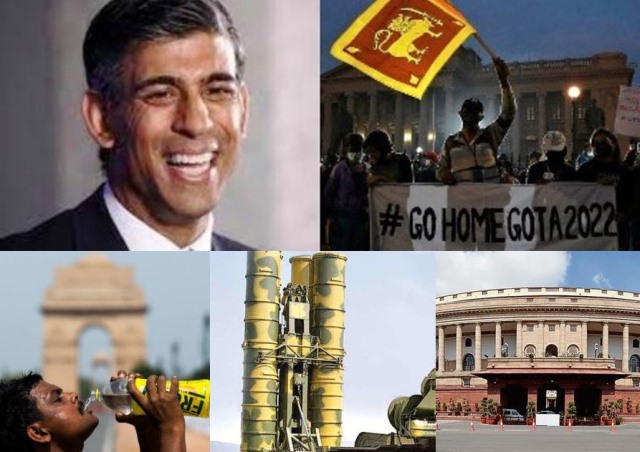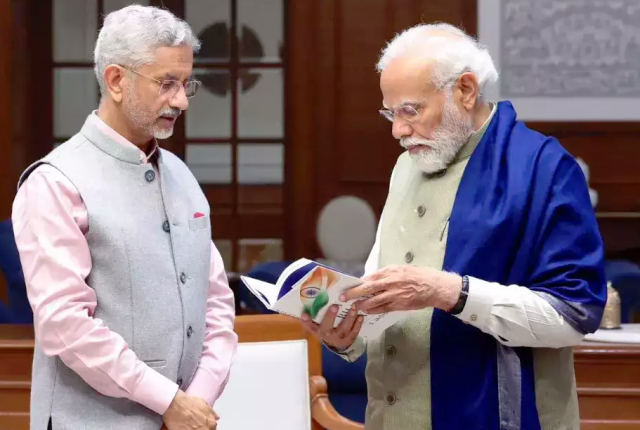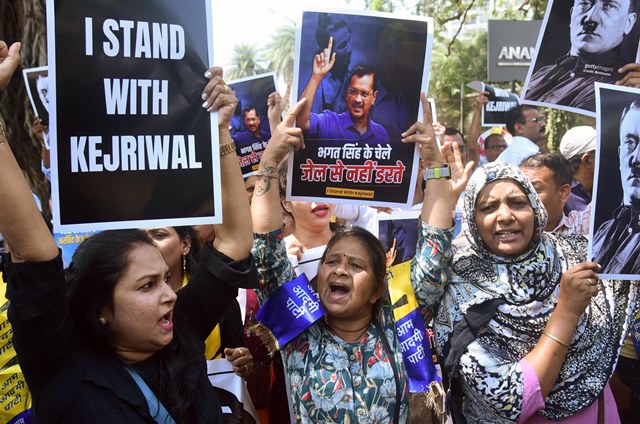
Five Things That Happened Last Week (And What to Make of Them)
If Rishi Sunak becomes Britain’s next PM, will Indians rejoice?
Among the five Tory leaders who will make it to the third round of voting to select the candidate who will replace the outgoing Prime Minister Boris Johnson, former Chancellor Rishi Sunak, 42, is leading. Although he was born in the UK, Sunak’s Indian connection is his parents who are Indians that migrated from East Africa. But that is not his only link with India. Sunak is married to the daughter of N.R. Narayana Murthy, the billionaire co-founder of Indian infotech giant, Infosys.
If Sunak does succeed Johnson, you can safely expect the Indian media to go berserk, appropriating him as “one of us”. It’s usually the way it goes. Whether it is Kamala Harris, the current US vice-president, or Bobby Jindal, the former Louisiana governor, anyone with the slightest trace of Indian heritage is quickly adopted as an object of adulation by the Indian media. So wait for it. There could be a deluge of hagiographical gush pieces that could assault us if Sunak makes it to 10 Downing Street.
Sri Lanka’s leadership crisis and what it means
It could have been a scene from a movie set in a banana republic. Last Wednesday, the president of Sri Lanka, Gotabaya Rajapaksa hurriedly left the country for Maldives not long after thousands of angry protestors broke into his official residence, swam in his pool and called for his resignation. The resignation came later in the week, after Rajapaksa moved to Singapore from Maldives and put in his papers.
Rajapaksa’s resignation finally came after several months of unrest in the island nation following economic mismanagement by his government that has led to widespread suffering for the country’s citizens. Sri Lanka’s 22 million people have been facing hardships, including the impact of runaway inflation, food and fuel shortage and a near-breakdown of the economy. Sri Lanka also has huge outstanding sovereign debt, much of which is held by China, India, and Japan. And whoever succeeds Rajapaksa will have to tackle a task of complex and mammoth proportions.
Sri Lanka adopted the presidential form of government in 1978. For much of the past two decades, the Rajapaksas have ruled Sri Lanka with almost unlimited powers. Gotabaya Rajapaksa is not the first of his family to rule the country. His brother Mahinda was elected president in 2005 and was considered a hero with legendary status in 2009 when he quashed the more than 25-year-old civil war against Tamil rebels. But he ran the country as a family business, installing his brothers, Gotabaya and Basil, in key government positions.
Gotabaya assumed office as president in 2019 but the economic crisis that followed has now taken its toll. Following the recent developments and his eventual resignation, the question uppermost on most analysts’ minds is first, whether this is the final denouement for the Rajapaksa clan; and second, what is in store for the tiny but troubled island country next.
A win for India as US House gives nod to Russian missile deal
With Russian aggression in Ukraine continuing, the US sanctions against Russia and those countries buying defence equipment from Russia is a punitive one. Countering America’s Adversaries Through Sanctions Act (CAATSA) aims at penalising countries that engage in deals with Russia.
The fact is India buys defence equipment running into billions of dollars from Russia. From 2011 to 2022, Russia made US$22.8 billion worth of arms transfers to India, which was 42.5 percent higher than the previous decade. Now, India is spending $5.5 billion on the Russian S-400 surface-to-air missile platform. The U.S.-made Terminal High-Altitude Area Defence system costs many times more and is not as effective for India’s needs.
Under CAATSA, this sort of a deal would have attracted US sanctions against India. But in a recent development, the US House of Representatives voted against imposing sanctions against India on the grounds that India has to protect its sovereignty along the Indo-Chinese border. According to Ro Khanna, the US representative from California, “The United States must stand with India in the face of escalating aggression from China. As Vice Chair of the India Caucus, I have been working to strengthen the partnership between our countries and ensure that India can defend itself along the Indian Chinese border.” Yet another instance of the Chinese bogey coming to the aid of India’s diplomatic relations with the US.
Q. How many people died in India’s heat wave? A. We don’t know
In the 100 days between end-March to late June, the temperature remained higher than 38 degrees Celsius every day except 15 days in most of India. In some places the temperature rose to more than 50 degrees Celsius. Yet, there is no accurate date on how many fatalities this freak heat wave may have caused.
According to scientific research, some of which is ongoing at top institutes in the world, the combination of high heat and humidity produces what is termed as the “wet-bulb temperature” whose minimum threshold is around 35 degrees Celsius (wet bulb temperature is the lowest temperature to which air can be cooled by the evaporation of water into the air at a constant pressure). It is believed that exposure to wet-bulb temperature above 35 degrees can be fatal for even healthy and young people.
The heat wave in India has been devastating. However, according to an article in the New York Times, there is a surprising lack of data on the number of fatalities that the sustained spike in temperature may have caused during March-June. Why?
Is it because India’s official data for deaths (as it has allegedly been during the most serious waves of Covid) suffers from undercounting? Or is it because in many parts of India, the level of humidity accompanying the high temperature was low? (Apparently, high temperatures accompanied by high humidity levels are the commonest cause for heat wave related deaths). Or, is it because Indians are adapting better to increasing temperatures by adopting simple solutions of keeping cool (example: in vast regions of the country, when temperatures shoot up, people hang wet sheets that help keep their homes cooler).
The New York Times article attempts to answer these and other questions. It’s an essential read.
NSFW words for our lawmakers
NSFW (Not Safe for Work) is a term used to warn readers or viewers that some content is not appropriate for reading or viewing at work. But recently, India’s Lok Sabha Secretariat has released a list of words that it considers unparliamentary for use in parliamentary discourses. Many words – such as ‘corruption’, ‘corrupt’, ‘Jumlajeevi’, ‘tanashah’, ‘Dictator’, ‘black’ and ‘Khalistani’ are among those that have been banned. Parliamentarians will not be allowed to use these words during their speeches, interjections and other statements from the Monsoon session that begins on July 18.
Other words that have been banned include ‘Baal buddhi’, ‘Covid spreader’, ‘anarchist’, ‘Shakuni’, ‘dictatorial’, ‘taanashah’, ‘taanashahi’, ‘Jaichand’, ‘vinash purush’, ‘dohra charitra’, ‘nikamma’, ‘nautanki’, ‘dhindora peetna’ and ‘behri sarkar’ and ‘Snoopgate’.
Needless to say that this has sparked protests from the Opposition. Congress leader Rahul Gandhi tweeted: “New Dictionary for New India” with the image:

Others such as the Trinamool Congress’ Derek O’Brien tweeted: “I will use all these words. Suspend me. Fighting for democracy.”
We will have to wait and see what happens when the session begins and the fun starts.




This weekly wrapup of developments across the world has the promise of becoming engaging reading. What happens in India apart – we have two local pieces to make us sit up – the author has carefully chosen international events that will leave an impact on India. A challenging assignment, but the author with interest across political, social and economic subject will surely make a success of it. I wonder if he will include cultural issues such as books and music in the weekly feature occasionally.